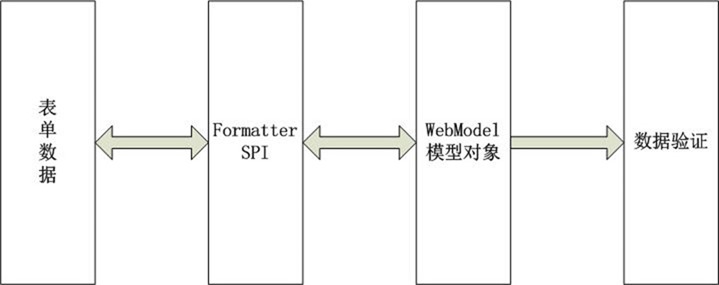SpringMVC学习系列(7) 之 格式化显示
在系列(6)中我们介绍了如何验证提交的数据的正确性,当数据验证通过后就会被我们保存起来。保存的数据会用于以后的展示,这才是保存的价值。那么在展示的时候如何按照要求显示?(比如:小数保留一定的位数,日期按指定的格式等)。这就是本篇要说的内容—>格式化显示。
从Spring3.X开始,Spring提供了Converter SPI类型转换和Formatter SPI字段解析/格式化服务,其中Converter SPI实现对象与对象之间的相互转换,Formatter SPI实现String与对象之间的转换,Formatter SPI是对Converter SPI的封装并添加了对国际化的支持,其内部转换还是由Converter SPI完成。
下面是一个简单的请求与模型对象的转换流程:
Spring提供了FormattingConversionService和DefaultFormattingConversionService来完成对象的解析和格式化。Spring内置的几种Formatter SPI如下:
| 名称 | 功能 |
| NumberFormatter | 实现Number与String之间的解析与格式化 |
| CurrencyFormatter | 实现Number与String之间的解析与格式化(带货币符号) |
| PercentFormatter | 实现Number与String之间的解析与格式化(带百分数符号) |
| DateFormatter | 实现Date与String之间的解析与格式化 |
| NumberFormatAnnotationFormatterFactory | @NumberFormat注解,实现Number与String之间的解析与格式化,可以通过指定style来指示要转换的格式(Style.Number/Style.Currency/Style.Percent),当然也可以指定pattern(如pattern=“#.##”(保留2位小数) ),这样pattern指定的格式会覆盖掉Style指定的格式 |
| JodaDateTimeFormatAnnotationFormatterFactory | @DateTimeFormat注解,实现日期类型与String之间的解析与格式化这里的日期类型包括Date、Calendar、Long以及Joda的日期类型。必须在项目中添加Joda-Time包 |
下面就开始演示:
首先把Joda-Time包添加到之前的项目中,这里用的是joda-time-2.3.jar,在views文件夹下添加一个formattest.jsp视图,内容如下:
<%@ page language="java" contentType="text/html; charset=UTF-8" pageEncoding="UTF-8"%> <!DOCTYPE html PUBLIC "-//W3C//DTD HTML 4.01 Transitional//EN" "http://www.w3.org/TR/html4/loose.dtd"> <html> <head> <meta http-equiv="Content-Type" content="text/html; charset=UTF-8"> <title>Insert title here</title> </head> <body>
money:<br/>${contentModel.money}<br/> date:<br/>${contentModel.date}<br/>
</body> </html>
1.首先我们直接用Formatter来做演示,在com.demo.web.models包中添加FormatModel.java内容如下:
package com.demo.web.models; public class FormatModel{ private String money; private String date; public String getMoney(){ return money; } public String getDate(){ return date; } public void setMoney(String money){ this.money=money; } public void setDate(String date){ this.date=date; } }
在com.demo.web.controllers包中添加FormatController.java内容如下:
package com.demo.web.controllers; import java.math.RoundingMode; import java.util.Date; import java.util.Locale; import org.springframework.context.i18n.LocaleContextHolder; import org.springframework.format.datetime.DateFormatter; import org.springframework.format.number.CurrencyFormatter; import org.springframework.stereotype.Controller; import org.springframework.ui.Model; import org.springframework.web.bind.annotation.RequestMapping; import org.springframework.web.bind.annotation.RequestMethod; import com.demo.web.models.FormatModel; @Controller @RequestMapping(value = "/format") public class FormatController { @RequestMapping(value="/test", method = {RequestMethod.GET}) public String test(Model model) throws NoSuchFieldException, SecurityException{ if(!model.containsAttribute("contentModel")){ FormatModel formatModel=new FormatModel(); CurrencyFormatter currencyFormatter = new CurrencyFormatter(); currencyFormatter.setFractionDigits(2);//保留2位小数 currencyFormatter.setRoundingMode(RoundingMode.HALF_UP);//向(距离)最近的一边舍入,如果两边(的距离)是相等的则向上舍入(四舍五入) DateFormatter dateFormatter=new DateFormatter(); dateFormatter.setPattern("yyyy-MM-dd HH:mm:ss"); Locale locale=LocaleContextHolder.getLocale(); formatModel.setMoney(currencyFormatter.print(12345.678, locale)); formatModel.setDate(dateFormatter.print(new Date(), locale)); model.addAttribute("contentModel", formatModel); } return "formattest"; } }
运行测试:
更改浏览器首选语言:
刷新页面:
2.这次用DefaultFormattingConversionService来做演示,把FormatController.java改为如下内容:
package com.demo.web.controllers; import java.math.RoundingMode; import java.util.Date; import org.springframework.format.datetime.DateFormatter; import org.springframework.format.number.CurrencyFormatter; import org.springframework.format.support.DefaultFormattingConversionService; import org.springframework.stereotype.Controller; import org.springframework.ui.Model; import org.springframework.web.bind.annotation.RequestMapping; import org.springframework.web.bind.annotation.RequestMethod; import com.demo.web.models.FormatModel; @Controller @RequestMapping(value = "/format") public class FormatController { @RequestMapping(value="/test", method = {RequestMethod.GET}) public String test(Model model) throws NoSuchFieldException, SecurityException{ if(!model.containsAttribute("contentModel")){ FormatModel formatModel=new FormatModel(); CurrencyFormatter currencyFormatter = new CurrencyFormatter(); currencyFormatter.setFractionDigits(2);//保留2位小数 currencyFormatter.setRoundingMode(RoundingMode.HALF_UP);//向(距离)最近的一边舍入,如果两边(的距离)是相等的则向上舍入(四舍五入) DateFormatter dateFormatter=new DateFormatter(); dateFormatter.setPattern("yyyy-MM-dd HH:mm:ss"); DefaultFormattingConversionService conversionService = new DefaultFormattingConversionService(); conversionService.addFormatter(currencyFormatter); conversionService.addFormatter(dateFormatter); formatModel.setMoney(conversionService.convert(12345.678, String.class)); formatModel.setDate(conversionService.convert(new Date(), String.class)); model.addAttribute("contentModel", formatModel); } return "formattest"; } }
这次没有了Locale locale=LocaleContextHolder.getLocale();再次运行测试并更改语言后刷新,可以看到与第一种方法截图同样的效果,说明DefaultFormattingConversionService会自动根据浏览器请求的信息返回相应的格式。
3.估计有人会觉得,啊…我只是想要格式化显示而已,还要这么麻烦,写代码一个字段一个字段的转换???别急,上面只是对内置的格式化转换器做一下演示,实际项目中肯定不会这么用的,下面就介绍一下基于注解的格式化。首先把FormatModel.java改为如下内容:
package com.demo.web.models; import java.util.Date; import org.springframework.format.annotation.DateTimeFormat; import org.springframework.format.annotation.NumberFormat; import org.springframework.format.annotation.NumberFormat.Style; public class FormatModel{ @NumberFormat(style=Style.CURRENCY)
private double money; @DateTimeFormat(pattern="yyyy-MM-dd HH:mm:ss") private Date date; public double getMoney(){ return money; } public Date getDate(){ return date; } public void setMoney(double money){ this.money=money; } public void setDate(Date date){ this.date=date; } }
注意:这里的money和date不再是String类型,而是它们自己本来的类型。
把FormatController.java改为如下内容:
package com.demo.web.controllers; import java.util.Date; import org.springframework.stereotype.Controller; import org.springframework.ui.Model; import org.springframework.web.bind.annotation.RequestMapping; import org.springframework.web.bind.annotation.RequestMethod; import com.demo.web.models.FormatModel; @Controller @RequestMapping(value = "/format") public class FormatController { @RequestMapping(value="/test", method = {RequestMethod.GET}) public String test(Model model) throws NoSuchFieldException, SecurityException{ if(!model.containsAttribute("contentModel")){ FormatModel formatModel=new FormatModel(); formatModel.setMoney(12345.678); formatModel.setDate(new Date()); model.addAttribute("contentModel", formatModel); } return "formattest"; } }
注意:这里代码里面只有赋值已经没有格式化的内容了。
更改视图formattest.jsp的内容如下:
<%@ page language="java" contentType="text/html; charset=UTF-8" pageEncoding="UTF-8"%> <!DOCTYPE html PUBLIC "-//W3C//DTD HTML 4.01 Transitional//EN" "http://www.w3.org/TR/html4/loose.dtd"> <%@taglib prefix="spring" uri="http://www.springframework.org/tags" %>
<html> <head> <meta http-equiv="Content-Type" content="text/html; charset=UTF-8"> <title>Insert title here</title> </head> <body> money:<br/> <spring:eval expression="contentModel.money"></spring:eval><br/> date:<br/> <spring:eval expression="contentModel.date"></spring:eval><br/> </body> </html>
注意:这里需要添加引用<%@taglib prefix="spring" uri="http://www.springframework.org/tags" %>,并用spring:eval来绑定要显示的值。
运行测试更改浏览器语言然后刷新页面依然可以看到以第一种方法截图相同的效果,证明注解有效。
格式化显示的内容到此结束。
代码下载:http://pan.baidu.com/s/1qWM3Zf2
注: 之前没注意前11篇的示例代码,不知道为什么当时打包上传上去的是没有.project项目文件的,导致下载后不能直接导入eclipse运行,虚拟机又 被我删掉了,这些示例代码也没有备份,但是代码文件还在的,所以可以新建一个Dynamic Web Project把对应的配置文件和controller还有view导入就可以了,给大家造成的不便说声抱歉。





